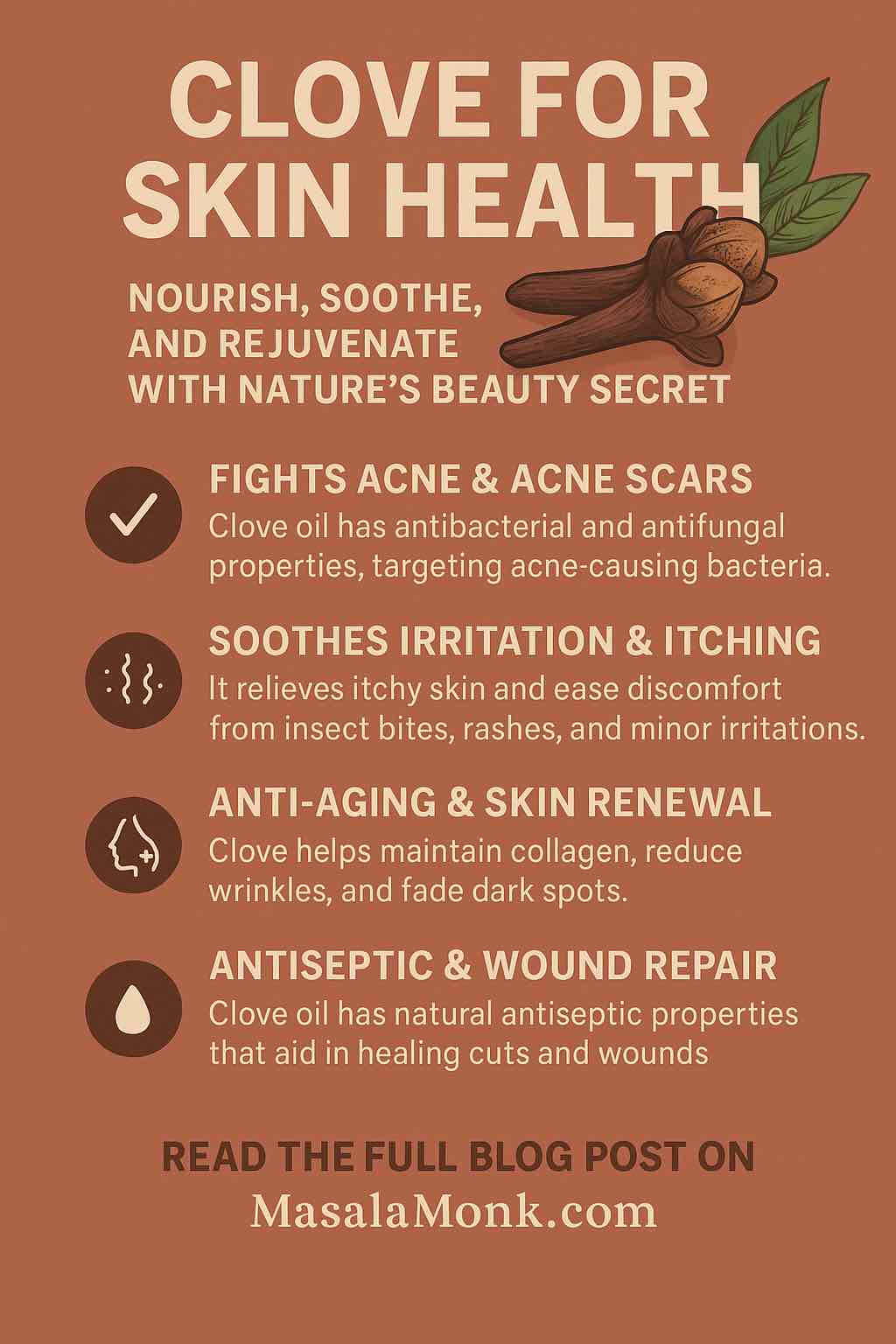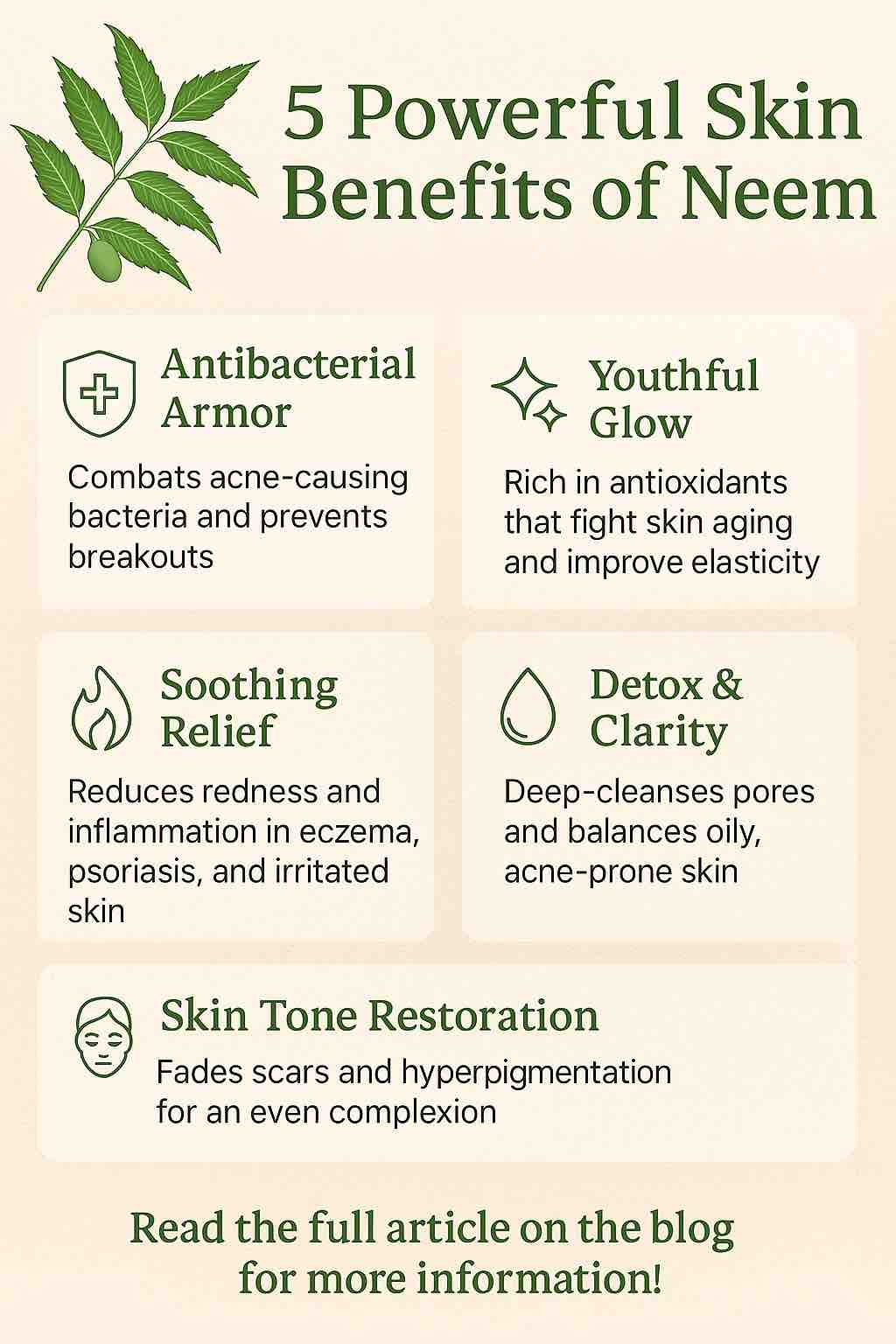
In a world overflowing with skincare fads and “miracle” ingredients, it’s easy to overlook the natural wonders tucked away in your spice cabinet. Clove—the aromatic flower bud from Syzygium aromaticum—is one such gem, cherished for centuries in Ayurvedic, Chinese, and folk medicine. But it’s not just tradition or folk wisdom; modern science is catching up, and the results are stunning.
If you want skin that is clear, resilient, youthful, and glowing—without the harsh chemicals—let’s unlock the power of clove together. This blog post explores how clove supports skin health, what the latest research reveals, how you can use it at home, and the real-world precautions you must know.
The Science of Clove: What Makes It Special?
The Secret Compounds
- Eugenol: The dominant compound in clove oil (70–90%), eugenol is a powerhouse antioxidant, anti-inflammatory, and antimicrobial agent. It’s the reason dentists use clove for numbing and why your grandma might have reached for it for a toothache.
- β‑Caryophyllene: A lesser-known, but potent, anti-inflammatory compound also found in black pepper and cannabis.
- Other Phytochemicals: Flavonoids, tannins, and triterpenoids—offering skin-protective, wound-healing, and calming effects.
These compounds act together to fight microbes, tame inflammation, soothe itching, and even support the skin’s natural healing and anti-aging processes.
Clove for Skin: Evidence-Based Benefits
1. Acne and Breakout Control
- How it works: Clove oil is a natural enemy of Cutibacterium acnes and Staphylococcus aureus—the bacteria that cause pimples and inflamed breakouts.
- Real use: Mix a single drop of clove oil into a teaspoon of jojoba or coconut oil, and dab it gently onto active spots. Clinical studies show a significant reduction in redness and swelling within days.
- Bonus: Its antifungal properties also help with conditions like athlete’s foot or fungal acne.
2. Soothing Itch and Irritation
- Clinical insight: A 2024 study confirmed that diluted clove oil outperformed petroleum jelly in relieving chronic itch (pruritus), making it a natural alternative for those with eczema, dermatitis, or even bug bites.
- How to try: Blend a few drops into your favorite unscented moisturizer and use as needed on itchy patches (avoid broken skin).
3. Wound Healing and Repair
- Latest research (2025): Cutting-edge nanotechnology is now used to deliver clove oil in “nanosponges,” which offer sustained release and zero skin irritation—unlike pure, undiluted clove oil, which can sting. Animal and cell studies show these gels accelerate healing, reduce inflammation, and minimize scarring.
- Practical takeaway: While these advanced gels may not be widely available in stores yet, you can use well-diluted clove oil for minor cuts and scrapes at home.
4. Anti-Aging and Skin Rejuvenation
- Lab evidence: Clove oil suppresses enzymes that break down collagen and trigger wrinkling. Studies show it boosts procollagen (the precursor to collagen), fights UV-induced damage, and brightens uneven tone.
- How to use: Add a tiny amount to homemade serums or masks, always with a carrier oil and never directly on the skin.
How to Use Clove for Skin—Safely and Effectively
The Rules of the Game
- Dilute, Dilute, Dilute: Never apply clove oil neat! Use at a concentration of 0.5–1%—that’s about 1–2 drops per tablespoon of carrier oil (e.g., jojoba, almond, coconut).
- Patch Test: Even diluted, clove oil is potent. Apply to a small spot on your forearm and wait 24 hours before using widely.
- Avoid Sensitive Areas: Do not use on lips, around the eyes, or on mucous membranes. Never use on infants, and consult a doctor if you’re pregnant, nursing, or have sensitive skin conditions.
- Combine Wisely: For pain or severe itching, you can blend clove oil with traditional remedies (like lidocaine gel)—but only with medical guidance.
Practical DIY Recipes
1. Clove Spot Acne Treatment
Ingredients:
- 1 drop clove essential oil
- 1 teaspoon jojoba or coconut oil
How to Use: Mix well, dip a cotton swab, and apply directly to pimples after cleansing. Use once daily.
2. Soothing Clove Itch Relief Balm
Ingredients:
- 2 drops clove oil
- 1 tablespoon shea butter
- 1 teaspoon sweet almond oil
How to Use: Whip all ingredients together, store in a small jar, and use on itchy, irritated areas as needed.
3. Gentle Clove Face Mask for Brightening
Ingredients:
- 1 teaspoon clove powder (not oil)
- 1 tablespoon honey or plain yogurt
How to Use: Mix, apply to clean face for 5–10 minutes, then rinse. Use weekly.
Advanced: What’s New and Exciting?
- Nanosponges and Gels: The future of clove in skincare lies in slow-release formulations, offering all the benefits with virtually zero irritation. Watch for these ingredients in next-gen skincare products.
- Clove + Conventional Treatments: Blends of clove and lidocaine are already being used clinically for pain management, showing improved results over lidocaine alone.
Frequently Asked Questions
1. Is clove oil safe for direct application to the skin?
No. Clove oil is very potent and should never be used undiluted on the skin. Always mix it with a carrier oil (like coconut, almond, or jojoba oil) at a concentration below 1% before topical use.
2. How can clove help with acne and pimples?
Clove oil is naturally antibacterial and anti-inflammatory. When diluted, it can reduce redness, swelling, and kill acne-causing bacteria. Apply only on affected areas for best results.
3. Can clove oil help with dark spots or hyperpigmentation?
Clove’s antioxidants may help fade dark spots and even out skin tone with regular use. However, results vary, and it’s best used as a supplement to—not a replacement for—sun protection and other brightening agents.
4. What’s the safest way to patch test clove oil before using it on my face?
Dilute the oil as directed, apply a small amount to the inside of your forearm, and wait 24 hours. If no redness or irritation appears, it’s likely safe to use elsewhere.
5. Can I use clove oil on sensitive or eczema-prone skin?
Exercise caution. Clove oil can irritate sensitive or broken skin. Consult a dermatologist before using it if you have eczema or other skin conditions.
6. Is clove oil effective for itch relief?
Yes. Studies have shown diluted clove oil can effectively relieve itching (pruritus), especially for chronic cases, and works better than petroleum jelly in some cases.
7. Are there any side effects to using clove on the skin?
Possible side effects include burning, irritation, allergic reaction, and sensitization with prolonged use or if undiluted. Always dilute and patch test first.
8. Can I make my own clove-infused skincare at home?
Absolutely! You can add a drop or two of clove oil to your homemade serums, balms, or masks—but always follow proper dilution guidelines. Avoid direct contact with eyes and mucous membranes.
9. Are there ready-made skincare products with clove available?
Yes, some natural and Ayurvedic skincare brands include clove in spot treatments, balms, and creams—often blended with other soothing botanicals. Check labels for concentration and do a patch test.
10. Can pregnant or breastfeeding women use clove oil on their skin?
It’s best to avoid essential oils, including clove, during pregnancy and breastfeeding unless approved by a healthcare provider, as some compounds can be absorbed through the skin.
Final Thoughts: Nature’s Beauty Secret, But Handle With Care
Clove is much more than a holiday spice—it’s a clinically validated, multi-functional skincare ally that can help you conquer acne, soothe irritation, support healing, and keep skin looking younger for longer. But respect its potency: Always dilute, patch test, and don’t go overboard.
As science continues to refine how we use clove—think nanotechnology and advanced gels—the future looks bright for this natural wonder.
Ready to Try?
Share your experience with clove in the comments! Want recommendations for ready-made clove skincare products, or guidance on building your own safe, effective routine? Drop your questions below.
Stay radiant, stay natural!










